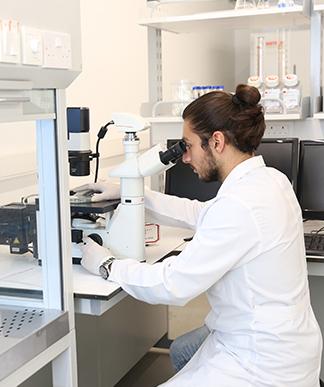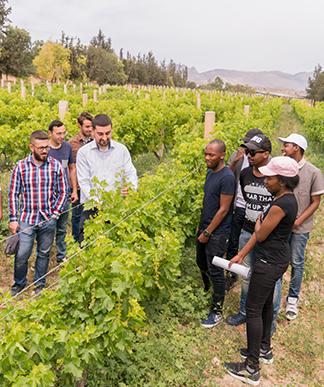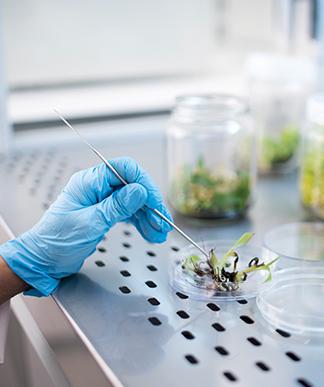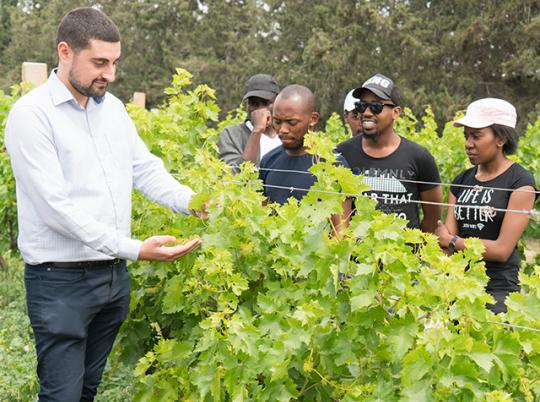Plant Science and Technologies (PhD)



About the Program
The main objectives of our program are to support graduates of not only agriculture engineers and agronomists but also biologists, bioengineers and other graduates who want to specialize in plant science and technologies to further education at the academic level; to direct them to research and development to make careers; to transfer the obtained data into practice; and to strengthen international collaborations. Our program is capable of competing with programs in developed countries with its academic staff, plant and animal production facilities, laboratories and infrastructure. The incubation center of researching the scientific ways of increasing agricultural production with a collective understanding is the units of universities that provide doctorate education. In this respect, it has become the basic criterion of economic and social development to evaluate our agricultural elements in an effective, environmentally friendly and sustainable way, to put them into practice, and to contribute to obtaining more and higher quality yields from the unit area in the light of universal quality criteria by using state-of-the-art technologies. In this context, the basic vision of the program is to create an internationally recognized doctoral program with its graduates who can convey their continuously improving experiences with their contribution to science and education at national and international level.
Education Opportunities
There are senior lecturers who are experts in their fields, who will give lectures and provide scientific guidance to students within the framework of the Plant Science and Technologies Doctoral Program. With its advanced wired/wireless internet network and computer infrastructure, information can be easily accessed from periodical and non-periodical publications in the university's library, electronic periodicals, digital image files, and national and international publications during research and thesis preparation periods. During the thesis phase, the plant and animal production facilities and greenhouses of the University can be used for field studies where our students can do research. Within the program, molecular biology, physics, biochemistry, analytical chemistry, computer laboratory and central laboratory located in the university campus suitable for interdisciplinary studies can also be used. Doctoral projects can be supported by the university budget and contributions are made to applied education.

Career Areas
Bitki Bilimi ve Teknolojileri Bölümünde Doktora yapan öğrencilerin bilimsel bakış açıları ile birlikte uluslar arası ilişki ağları gelişecek, daha geniş vizyon sahibi olacak ve aynı zamanda mesleki kariyerlerinde yükselmelerine imkan sağlanacaktır. Halen ülkemizde ve dünyada tarım ve ilgili alanlarında doktora mezunu sayıları oldukça düşük olup talep günden güne artmaktadır. Doktora programımızı tamamlayan mezunların Bakanlıkların ilgili dairelerinde Araştırma enstitülerinde, belediyelerde, uluslararası tarımsal kuruluşlarda, danışmanlık şirketlerinde, gıda üretim kuruluşları ve Biyoteknoloji enstitülerinde istihdam edilebilirken üniversitelerde de öğretim üyesi olarak akademik kariyerlerine devam edebileceklerdir.
İletişim
Institute of Graduate Studies and Research
Graduate Sciences and Education Center, GE106
Tel: +90 392 671 1111 Extension: 2776
Institute E-mail: ciu-institute@ciu.edu.tr
Compulsory Courses
First Semester
Philosophy of Science
Course code
PHIL601Credit
3Theoretical
3Practical
0Ects
ALAN SEÇMELİ
Course code
PSCT6X1Credit
3Theoretical
3Practical
0Ects
AREA ELECTIVE
Course code
PSCT6X2Credit
3Theoretical
3Practical
0Ects
AREA ELECTIVE
Course code
PSCT6X3Credit
3Theoretical
3Practical
0Ects
Second Semester
ADVANCED RESEARCH TECHNIQUIES
Course code
BASC601Credit
3Theoretical
3Practical
0Ects
AREA ELECTIVE
Course code
PSCT6X4Credit
3Theoretical
3Practical
0Ects
AREA ELECTIVE
Course code
PSCT6X5Credit
3Theoretical
3Practical
0Ects
Third Semester
DOCTORAL QUALIFICATION
Course code
PSCT650Credit
0Theoretical
0Practical
0Ects
Fourth Semester
DOCTORATE DISSERTATION
Course code
PSCT600Credit
0Theoretical
0Practical
0Ects
Elective Courses
RESEARCH METHODS
Course code
EMNT525Credit
3Theoretical
3Practical
0Ects
0Students who are interested in pursuing advanced graduate studies leading to a master’s, doctoral degree or professional doctorate degree for the Fall and Spring semesters every year. Applicants can directly apply online to our graduate programs using the application portal.
TRNC Applicants- Required documents:
- Bachelor’s and Master’s Degree Diploma
- Bachelor’s and Master’s Degree transcripts for each completed academic term/year.
- Documents to prove English proficiency for English language departments,
- Scanned copy of passport or identity card.
Click for detailed admission requirements information.
Students who are interested in pursuing advanced graduate studies leading to a master’s, doctoral degree, or professional doctorate degree for the Fall and Spring semesters every year. Applicants can directly apply online to our graduate programs using the application portal.
International Applicants- Required documents:
- A valid Bachelor’s Degree and transcripts for each completed academic term/year.
- A valid Master’s Degree and transcripts for each completed academic term/year.
- Evidence of English Language competence: TOEFL (65 IBT) or IELTS (5.5). Students without these documents will take the CIU English proficiency exam on campus following arrival.
- Scanned copy of international passport/birth certificate
- CV
- Ph.D. research proposal
- Fully completed and signed CIU Rules and Regulations document (which can be downloaded during the online application)
Click for detailed admission requirements information.
Cyprus International University provides academic scholarships for its students as an incentive for success, with most students benefiting from 50%, 75% or 100% scholarships or discounted tuition fees. Click for more information.
Tuition Fees are determined at the beginning of each academic year. Candidate students who are entitled to enroll in CIU can learn their fees in line with the Tuition Fee Calculation system.